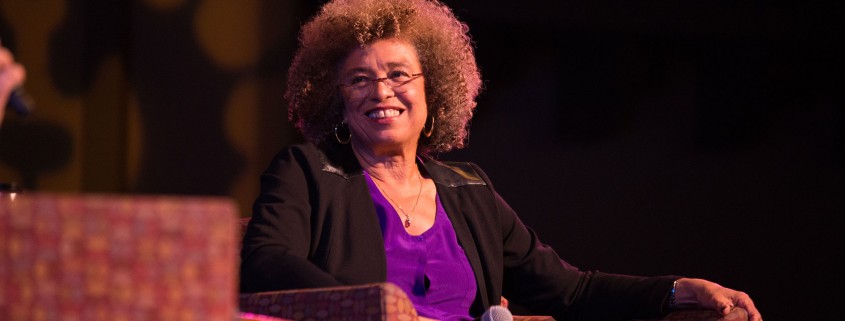Civil rights leader Angela Davis speaks at Bovard
Dr. Angela Davis, a prominent political activist, spoke at Bovard Auditorium on Monday night about topics that ranged from the prison-industrial complex to racial injustice in the Academy Awards.
Davis is known for her involvement in the counterculture movement during the 1960s. Today, she advocates for social justice causes such as prison reform, racial equality and gender equality.
Dr. Michelle Turner, director of the Black Alumni Association, moderated the event and welcomed Davis.
“[She] has been one of the most iconic women in the struggle for blacks in this country,” Turner said.
Davis grew up in Birmingham, Alabama, and moved to New York during high school. She attributes her accomplishments and outlook on political involvement to her upbrining.
“I always thought of myself as a part of a community,” Davis said. “I never thought of myself as an isolated individual. It really was never about my becoming something that set me apart from everyone else. It was about using the knowledge that I acquired, using whatever talents and skills I had, to further the struggle for freedom.”
Her appearance at USC came on a day of special importance to Davis: the anniversary of her release on bail after two years in prison. She had been arrested on charges of murder, kidnapping and conspiracy and was released on Feb. 23, 1972. Davis’ incarceration garnered international attention, resulting in a worldwide campaign to have her released.
One of the current focuses of Davis’ activism is the reform of the prison-industrial complex and the incarceration of large numbers of black people. According to Davis, incarcerating more people is a profitable enterprise for government and industry.
Davis also stressed the importance of viewing all social justice issues as interrelated. She mentioned domestic violence, mental illness and education disparity as components of a larger societal problem.
“I’m really interested in understanding connections, seeing ways in which all of the various social justice struggles that we’re involved in are connected, seeing the intersectionality of those struggles,” Davis said.
She did express her skepticism about what has been done to combat these social justice problems, however.
“I have a hard time accepting diversity as a synonym for justice. Diversity is a corporate strategy. It’s a strategy designed to ensure that the institution functions in the same way that it functioned before, except now that you now have some black faces and brown faces. It’s a difference that doesn’t make a difference,” Davis said.
Davis also offered a new outlook on race that she believes could revolutionize race relations in the United States by changing the system fundamentally.
She said colorblindness is not the solution to the problem of racism; instead, society should recognize inequalities and work to eliminate them.
“I see the role of colorblindness as being that of preventing people from understanding the depths of racism. Because racism is not simply about the color of an individual’s skin. It’s about structures of oppression and repression,” Davis said.
She encouraged students to continue pursuing their own interests in order to bring social change.
“We can never predict when change is going to come,” she said.


Angela Davis is not a “civil rights” leader.
Davis is right, colorblindness is not the solution to the problem of racism. When it comes to racial unity, color kindness will solve the problem. I can only hope Davis fully understands that racism today is a two way street where blacks are more racially prejudiced than whites. Where Is Love